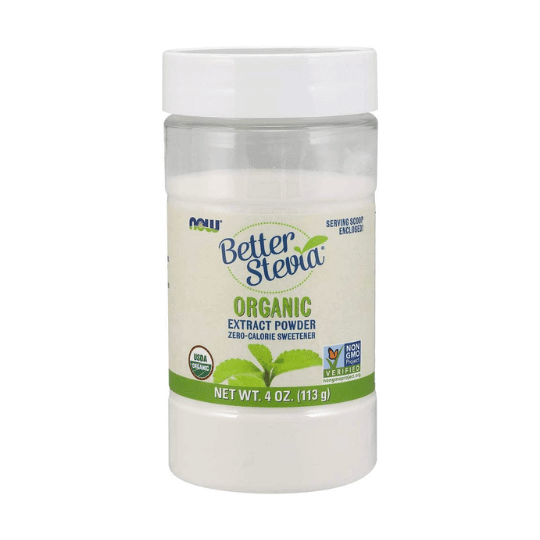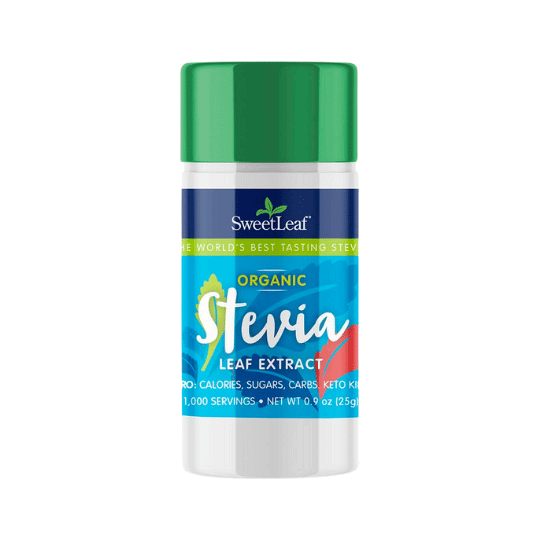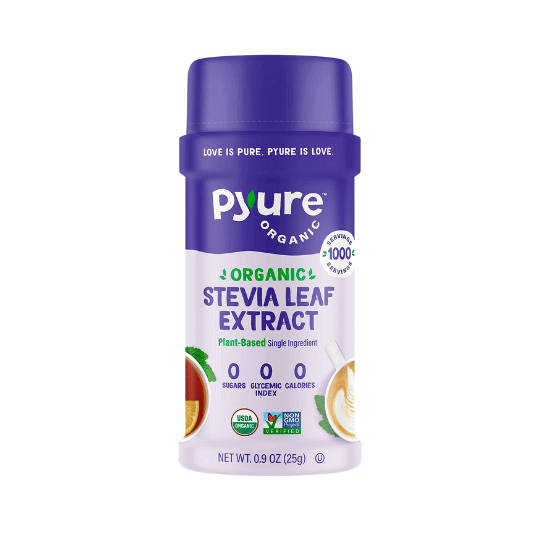Stevia has been a popular low-calorie sugar alternative for many years, but recent research has questioned its safety. So is stevia safe during pregnancy… or at all? Is it too good to be true? Is it actually “gut-safe” or a good alternative to other sweeteners?
Let’s dive into all the details on stevia. Keep reading to learn more!
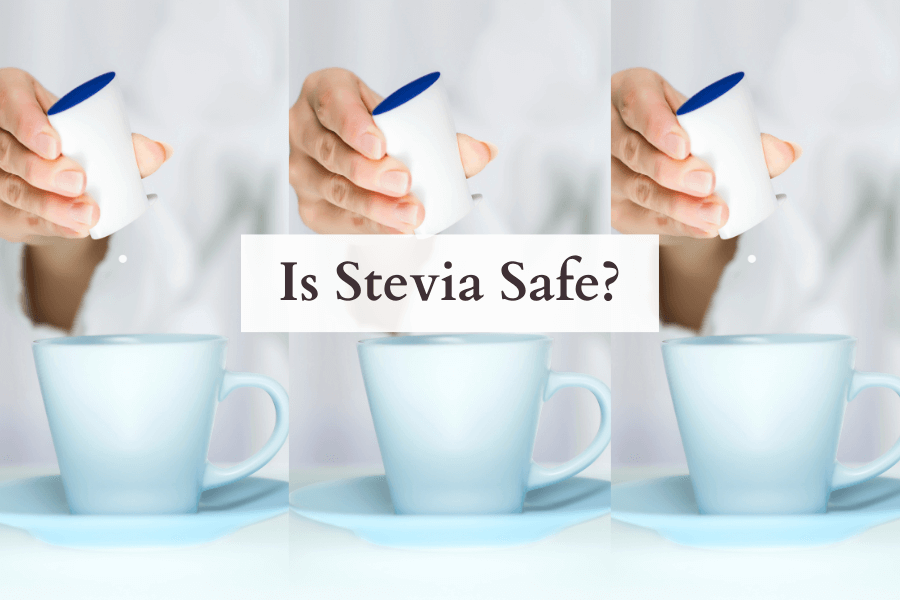
Note: This article contains affiliate links, meaning In On Around will make a small commission at no additional cost to you. This helps me maintain the site. As always, I value full transparency & only work with brands I love and trust.
What Is Stevia?
Stevia (Stevia rebaudiana), which is also called sweetleaf, candyleaf, sugarleaf, or rebiana, is derived from a brush plant in Central and South America. Stevia is calorie-free and has a glycemic index of zero (therefore it’s oftentimes used as a sugar alternative for diabetics). It’s a popular plant-based natural low-calorie sweetener and is considered a more natural alternative to artificial sweeteners.
Usually, stevia comes in either powder or liquid form. However, some people opt to consume stevia by grinding up its dried leaves into a powder (which is ultra-concentrated). Stevia extracts are created through a water extraction process using dried stevia plants.
Of course, consuming too much sugar is linked to obesity and type 2 diabetes, so stevia is a popular alternative. To learn more about 5 Healthier Alternatives To Soda & Sugary Drinks, read more here.
Fun Fact: China is currently the top global grower of stevia.
What Is Stevia Glycoside?
Stevia leaf extract is not necessarily made from one compound, it can contain over 40 different organic compounds called steviol glycosides. These steviol glycosides are what give stevia its unique sweet taste (some also have a bitter taste).
These are the most common steviol glycosides:
- Rebaudioside A (commonly used in sugar substitutes and tastes better than stevioside)
- Rebaudioside D (can be synthetic)
- Rebaudioside M (can be synthetic)
- Stevioside (most abundant in the stevia leaf with more of a bitter aftertaste)
These are highly purifier forms of stevia and it’s common for brands to use a mixture of a few rebaudioside in sweeteners since they range in sweetness/bitterness.
Pure rebiana (reb A) in stevia is 250-450x sweeter than table sugar. [1]
Is Stevia A Sugar Alcohol Or Artificial Sweetener?
No, stevia is not considered a sugar alcohol or an artificial sweetener. While artificial sweeteners are from molecules that don’t exist in nature, stevia is derived from a natural plant.
Sugar alcohols (also known as polyols) provide fewer calories than regular sugar, yet can cause digestive issues in some people. Popular sugar alcohols include xylitol, sorbitol, mannitol, maltitol, and more.
Keep in mind, however, that brands commonly use stevia with other sweeteners. Always read the full ingredient label to ensure they’re not mixing stevia with artificial sweeteners.
Interested in learning more about artificial sweeteners and sugar? I break it all down for you here.
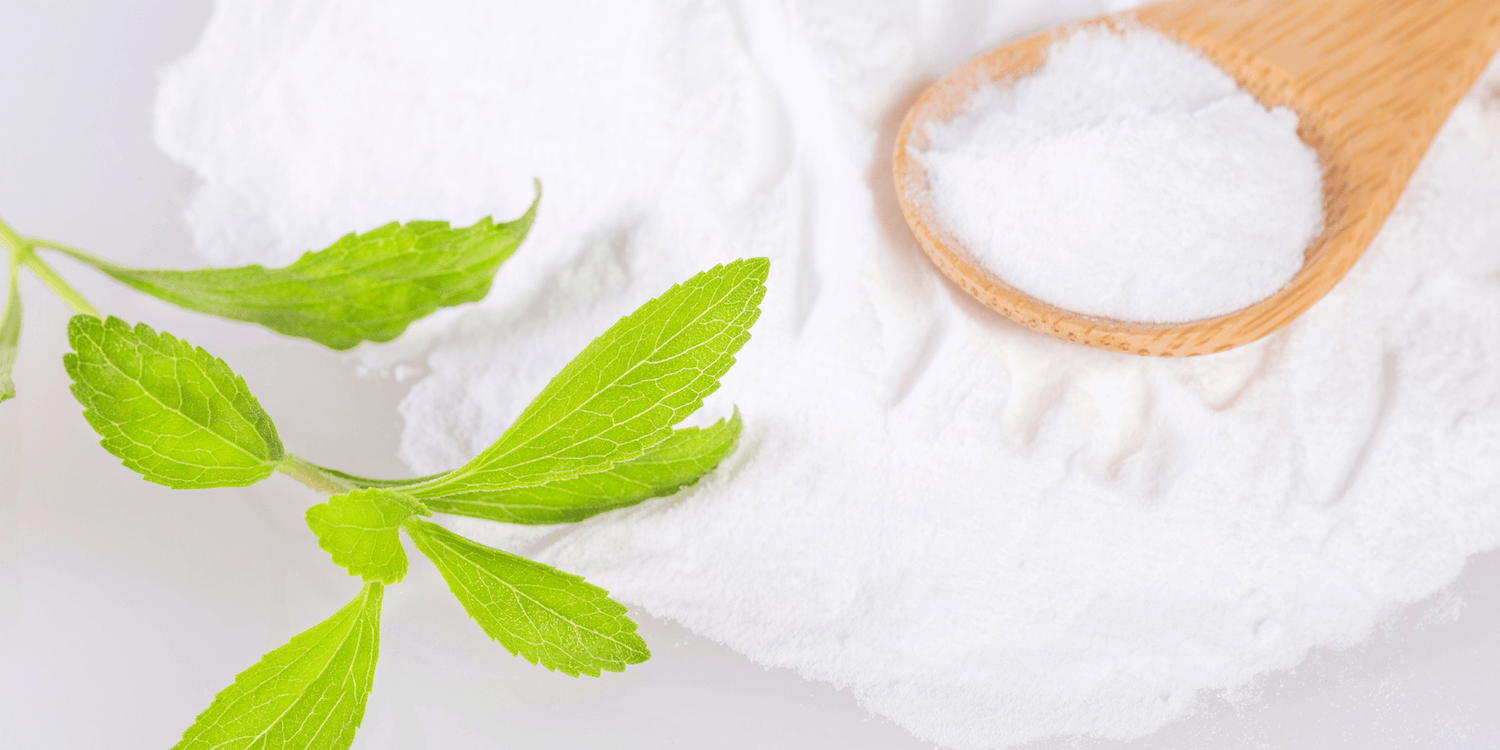
Potential Benefits Of Stevia
So… is stevia a friend or a foe? Let’s dive into the research.
Before we dive into the potential side effects of stevia, there are some noted benefits! For one, stevia is a lower–calorie alternative to sugar. For those who are watching their weight or have blood-sugar imbalance conditions, like diabetes, this can be a great option. In addition, when compared with sugar, stevia does not increase the risk of cavities (woohoo!).
In a 2012 study, researchers found that stevioside (which is a steviol glycoside found in stevia) can help with cancer cell death. However, this research needs to be further evaluated. [2]
Potential Side Effects Of Stevia
While stevia is generally recognized as safe (GRAS) by the Food & Drug Administration (FDA), there are certainly some potential side effects that should be noted. [3] The most notable concern with stevia lies in the potential for it to lead to gut health imbalance. [4] A study in Israel said that stevia does not kill good bacteria in the gut or alter gastrointestinal diversity, BUT it can create an imbalance making it difficult for bacteria to properly communicate with each other. A balanced gut microbiome is absolutely essential for your nervous system, weight management, heart function, immune system health, and so much more. A separate study from Spain said that it CAN potentially alter gut microbiota. [5]
Focus on moderation.
Long-term extensive use of stevia may also impact the nervous system, like with extremity tingling, numbness, or loss of motor control. Some individuals with psychological disorders can also potentially experience interference with antipsychotic medications. Some people also complain about headaches, bloating & diarrhea (especially when mixed with sugar alcohols).
When consuming too much stevia, you can potentially experience stomach pain, nausea, constipation, bloating, gas, or inflammation in the liver and kidneys. [6]
While one of these referenced studies analyzed over 372 studies, there noted that there are gaps in the evidence and more research must be conducted. Further research is needed!
Is Stevia Safe During Pregnancy?
Yes, stevia is safe to consume during pregnancy, but only in moderation. The FDA advises avoiding whole-leaf stevia and unrefined stevia (including home-grown stevia) while pregnant, due to concerns about the kidneys and reproductive system. It’s best to limit your consumption of any sweeteners whether you’re pregnant or not.
If pregnant, speak with your naturopathic primary care doctor.
Highly refined Reb-A has been tested and evaluated as safe during pregnancy, but unrefined stevia has not. It’s always best to err on the side of caution, especially when growing a baby.
As always, discuss the pros and cons of any new supplement with your primary care physician (or naturopathic doctor) before using it. It’s recommended by the American Dietetic Association to consume no more than 2 milligrams of stevia per pound of body weight daily. Keep it to a minimum, especially while pregnant.
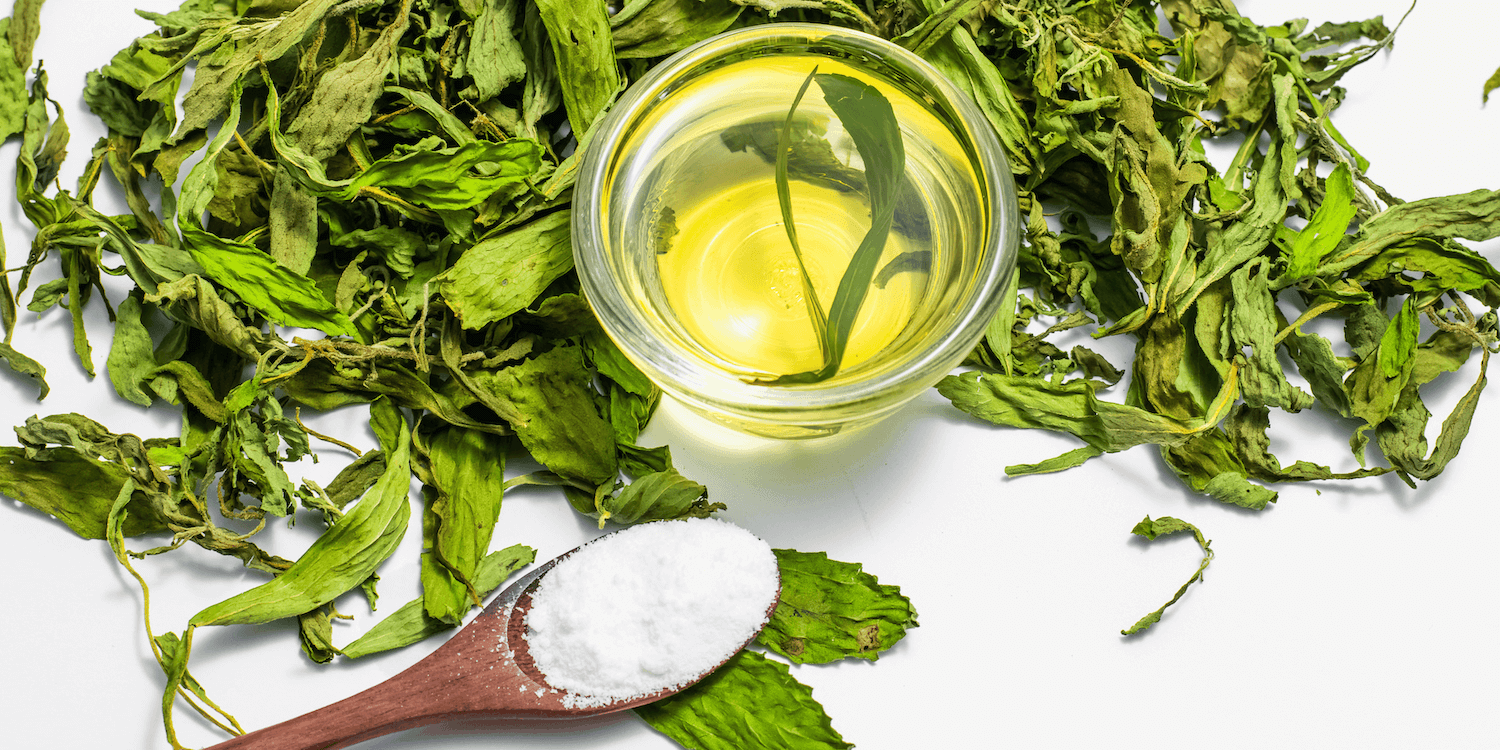
What To Look For When Buying Stevia?
It’s common for brands to mix pure stevia extract with other ingredients to tone down the sweetness. For instance, the brands Truvia, Pyure, Whole Earth, Splenda Naturals, and Wholesome mix stevia with the sugar alcohol erythritol. Stevia in the Raw, Pure Via, and mixes stevia with cane sugar (dextrose) as a bulking agent. Many brands, like Sweet Leaf (depending on the item), also can include natural flavors. Some brands, such as Wholesome and Thrive Market’s stevia, include inulin, which is another natural sweetener.
If the label says “stevia blend,” then it’s likely mixed with other ingredients, like artificial sweeteners.
When looking for stevia, avoid any added:
- Sugar (like dextrose)
- Sugar alcohols (like erythritol)
- Artificial sweeteners (like aspartame, saccharin, xylitol, sucralose & more)
- Artificial flavors
- Maltodextrin
- Natural flavors
- Non-organic stevia
The Best Stevia Brands
It’s best to opt for a 100% extract of refined organic stevia. Keep in mind that these are super sweet, so a very small amount can go a long way. For liquids, it’s best to use a brand mixed with organic cane alcohol and de-ionized water only, however, powder form is best. When you incorporate liquid, it must be mixed with a stabilizer.
For Powders
- NOW Foods Certified Organic Better Stevia Extract Powder
- SweetLeaf Organic Stevia Extract
- Pyure Organic Stevia Powder Extract
For Liquids
- NOW Foods Certified Organic Better Stevia Liquid
- Trader Joe’s also offers an Organic Liquid Stevia tincture bottle in stores.
If buying from an online marketplace, like Amazon, always ensure you’re buying directly from the company and not an unidentified 3rd-party. Always read the nutrition facts thoroughly. When cooking or baking, keep in mind that not all forms of stevia are a 1:1 sugar replacement.
What Alternatives To Stevia Are Available?
If you’re looking to minimize stevia consumption, you can instead opt for other natural sweeteners like honey, dates, coconut sugar, and maple syrup. These are forms of sugar, so they should also be kept to a minimum. Personally, I prefer natural forms of sugar instead of any sugar alternative.
One of the best things you can do is focus on improving your gut health! As mentioned above, if stevia can impact gut microbiome communication, supporting a healthy digestive system is essential.
Final Thoughts – The Bottom Line on Stevia
Do I think stevia is “bad”? No, not necessarily. Do I think you should have it in every meal? No, absolutely not. Especially if you already struggle with gastrointestinal health issues, it’s best to limit stevia as much as possible (as with sugar). As time goes on, more research will be conducted on stevia, especially during pregnancy. So moderation is key.
⬇ Pin this “Is Stevia Safe For Pregnancy?” pic on Pinterest for future reference! ⬇
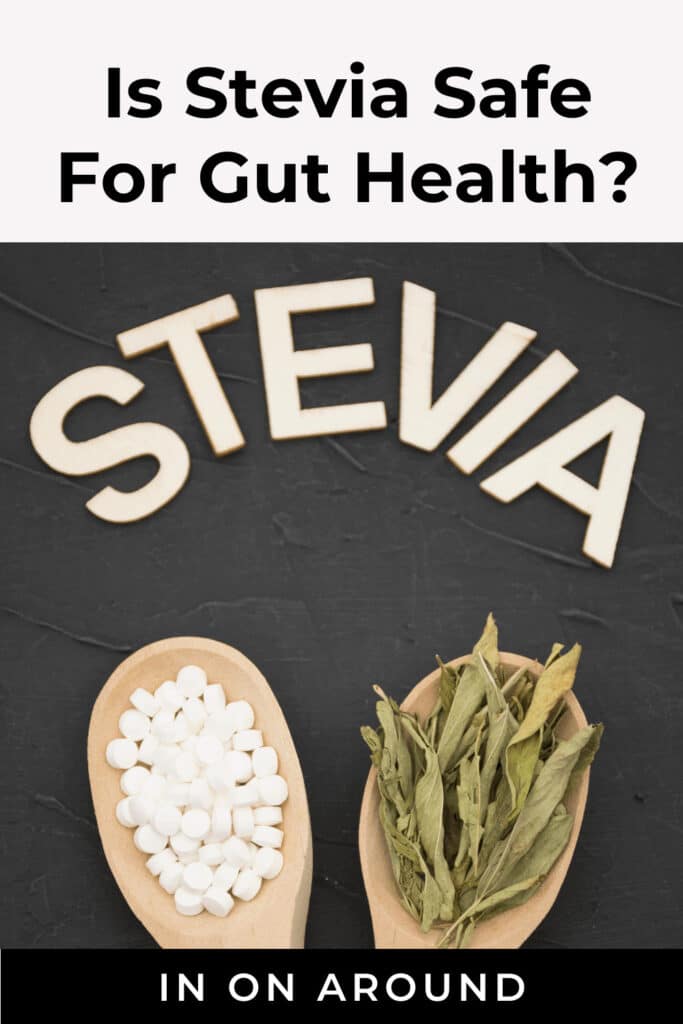
Frequently Asked Questions – Stevia Safety
Click on the below FAQs to learn more about this topic: “Is stevia safe during pregnancy?” Learn more about stevia safety on gut health!
What Is Stevia?
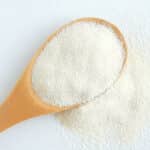
Stevia (Stevia rebaudiana), which is also called sweetleaf, candyleaf, sugarleaf, or rebiana, is derived from a brush plant in Central and South America. Stevia is calorie-free and has a glycemic index of zero (therefore it’s oftentimes used as a sugar alternative for diabetics). It’s a popular plant-based natural low-calorie sweetener and is considered a more natural alternative to artificial sweeteners.
Is Stevia A Sugar Alcohol Or Artificial Sweetener?
Is Stevia Safe During Pregnancy?

Yes, stevia is safe to consume during pregnancy, but only in moderation. The FDA advises avoiding whole-leaf stevia and unrefined stevia (including home-grown stevia) while pregnant, due to concerns about the kidneys and reproductive system. It’s best to limit your consumption of any sweeteners whether you’re pregnant or not.
What Is Mixed With Stevia?
Do you eat foods with stevia?
Let me know your thoughts and key takeaways in the comments below!
You can watch our web story here.
xoxo,

Want to read more? Check out my other articles here!
References on “Is Stevia Safe For Pregnancy?”: USDA, Brigham, Atlas Biomed, Very Well Fit, Neuroscience News, Shapely Ways, Insider, UF Health, Health-Ade, Endomune, Livestrong, Yale New Haven, MD Anderson, Fit Flavors, What Sugar, Endomune, News Medical, Menno Henselmans, American Pregnancy, Brigham, Healthfully, The Prenatal Nutrition
Copyright In On Around LLC 2022 ©. The statements made on this website have not been evaluated by the FDA (U.S. Food & Drug Administration). They are not intended to diagnose, treat, cure, or prevent any disease. The information provided by this website should not be used as individual medical advice and you should always consult your doctor for individual recommendations and treatment. The information contained in this site is provided on an “as is” basis. Related to this site, there are no guarantees of completeness, accuracy, usefulness, or timeliness. In On Around LLC assumes no responsibility or liability for any errors or omissions in the content of this site.

